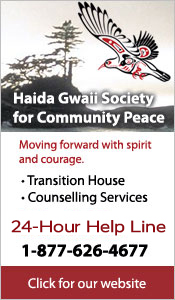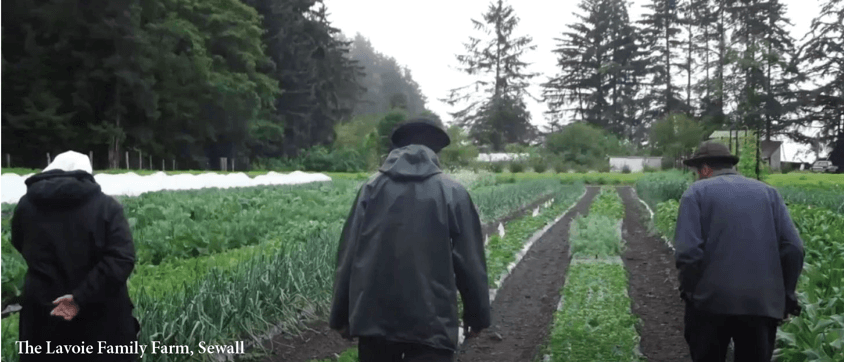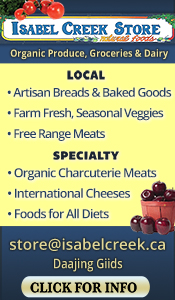| Farm to Table on Haida Gwaii |
 |
|
The Haida Gwaii Food Strategy (HGFS) is an all-is-land project that involves a number of organizations, including the Council of the Haida Nation (CHN); Haida Child and Family Services Society; Niislaa Naay Healing House and Xaay DaGa Dlaang Society: Healthy Haidas Program; Gwaii Trust; Skidegate Band Council; Local Food 2 School/Xaada Foods Committee; Swiilawiid; Haida Gwaii Museum; and Northern Health. Now, more than ever, people are embracing the truth of how vulnerable Haida Gwaii is in regards to the food we eat. It’s not just about supply, it’s about food quality and food economics. It’s also clear that food sovereignty success depends a great deal on the ability of our island communities to work together. Exploring this important topic, on February 4th, 2021 the HGFS’s fourth webinar series, hosted by Jisgaang Nika Collison, featured presentations from some of our most knowledgeable and hard-working local farmers. This included Don Richardson, Kevin Brown on behalf of the Lavoie Family Farm, Lynda Dixon, Ruth Wheadon, Miranda Barnhardt, and Elizabeth Condrotte. Topics discussed included what island food meant to each participant and what is needed to strengthen our local food industry.
Now, more than ever, people are embracing the truth of how vulnerable Haida Gwaii is in regards to the food we eat.
“The 2011 Misty Isles Economic Development Society [agricul-ture] report states that ‘1.3 acres is required to provide a healthy balanced diet for each person in BC.’ We believe that that is an underestimate due to our climate and soil on Haida Gwaii. We may need up to 8000 acres [1.6 acres per person] of land to be designated to grow enough food for 5,000 people.” – Kevin Brown on behalf of the Lavoie Family Farm, Sewall “Most of us growing food here are pretty much dedicated to the lifestyle of it… we’re not taking a lot of money home but we’re really passionate about the work and the food and how you raise your children on the land. It doesn’t matter what you get paid in the end, it’s a super valuable experience.” - Lynda Dixon, Maude Island Farm, Daajing Giids Queen Charlotte “I really liked having the different school groups and the elders come out for their farm tours. The energy and enthusiasm of ev-eryone who came was amazing. Some of them had never held a chick or a baby duck or even seen a live pig or sheep, so I thought that was very special, and we hope to be able to do that again. Maybe we can, just in a different way in the future.” – Miranda Barnhardt, Rainy Days Gardens, Tll.aal Tlell “Farming isn’t something you get rich on in a monetary sense, but it’s something that you get rich on from love-ly local food and getting to provide it to your communi-ty and contribute to your community.” Ruth Wheadon, Baru Farm, Daajing Giids Queen Charlotte “We need to control our own food sources - the produc-tion and the distribution - and not to have to go and ask outside sources. We also need the communication, com-mitment and cooperation of all islanders to make it work so that we have food security.” – Elizabeth Condrotte, Tlell Bay Farm, Tll.aal Tlell "Farm to Table” panelists answer the question, “What does the island need to be food independent in fifty years from now?”
If you would like to get involved with or offer your support to the Haida Gwaii Food Strategy, email This e-mail address is being protected from spambots. You need JavaScript enabled to view it Next HGFS webinar, “Nourish & Flourish – Hearing From Municipalities,” March 16th, 2021
Photos and webinar content courtesy of the Haida Gwaii Food Strategy
|







 “Every inhabitant on Haida Gwaii would benefit if our ferry was an essential highway. This in turn would give every farm the po-tential to become financially viable in the long term and it would lower input costs for all residents.” – Don Richardson, Richardson Ranch, Tll.aal Tlell
“Every inhabitant on Haida Gwaii would benefit if our ferry was an essential highway. This in turn would give every farm the po-tential to become financially viable in the long term and it would lower input costs for all residents.” – Don Richardson, Richardson Ranch, Tll.aal Tlell



